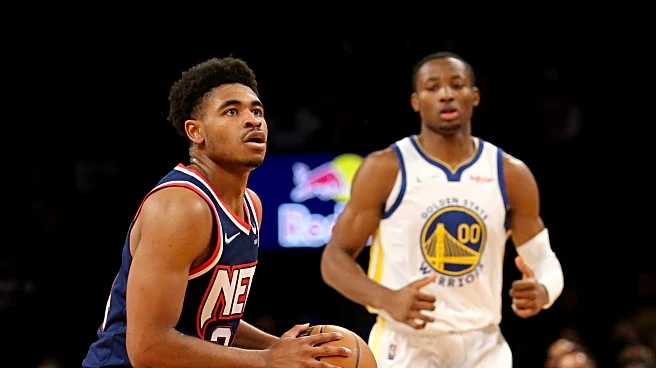Things have been very quiet in the NBA lately, save for, well … a highly suspicious incident involving Kawhi Leonard, the LA Clippers, and some highly credible accusations of cap skirting. But on Thursday
morning, some honest to goodness transaction news came across the wire, and it’s some that could end up impacting the Golden State Warriors. According to ESPN’s Shams Charania, Brooklyn Nets guard Cam Thomas has accepted the Qualifying Offer, which sends him back to Brooklyn for one year and $6 million.
Thomas is one of four restricted free agents who have been in a stalemate with their teams this offseason, joining the Chicago Bulls Josh Giddey, the Philadelphia 76ers Quentin Grimes, and the Warriors Jonathan Kuminga. There hasn’t been much traction lately for any of those four, so Thomas accepting a Qualifying Offer is a serious domino to fall.
So what does that mean for the Warriors and Kuminga, who has until the end of the month to accept or reject the Qualifying Offer, which would be $7.9 million in his case?
It makes Kuminga’s threat more credible
A few weeks ago, a report from ESPN surfaced that Kuminga was willing to accept the Qualifying Offer, even though it would be a massive discount from the two-year, $45 million contract that the Dubs were offering, which featured a team option in the second year. There was, understandably, a fair amount of skepticism as to whether Kuminga would actually be willing to take such a huge pay cut just to enter unrestricted free agency next summer. Many viewed the report as posturing by Kuminga to create leverage via a threat.
That threat looks a lot more viable now. Thomas, who has been a better player than Kuminga to this point in their careers, but has a more questionable injury history and perhaps a lower ceiling, is deserving of a contract in the same realm as JK. When my colleague Ricky O’Donnell predicted free agency contracts midway through July, he pegged Kuminga for a four-year, $95 million deal and Thomas for a three-year, $75 million contract. So this certainly isn’t a Patrick McCaw situation — Thomas deserves a huge paycheck and he’s sacrificing it for a chance to re-enter the market next year without restrictions. Not only is he sacrificing that larger contract, but he’s sacrificing it for a Qualifying Offer that’s nearly $2 million less than what Kuminga’s is.
So if Thomas is willing to do it, then so is Kuminga. I doubt the Warriors questioned the legitimacy of Kuminga’s threat, but if they did, they certainly don’t anymore.
It costs Kuminga some leverage
Kuminga and Thomas have been linked throughout the offseason, more so than Giddey or Grimes. They’re viewed as similar players: young, slightly raw, and dripping in scoring ability, with questions as to whether they can be the featured scorer on a good team (Thomas because he’s only been on bad teams; Kuminga because he’s never been the featured scorer).
If there’s one thing an agent loves when trying to get their client paid, it’s a comparable player signing a big deal. Had, for example, Thomas signed the previously suggested three-year, $75 million deal, with no team options, it would set the benchmark for Kuminga. He would have a data point to take back to Joe Lacob and Mike Dunleavy Jr., showing approximately how his worth is valued.
He could still get that. Giddey and Kuminga are perhaps similar enough that should the Timothée Chalamet lookalike sign a hearty deal with Chicago, it may serve as a good argument in Kuminga’s favor. Until then, the leverage shifts to the Warriors. Not only is Kuminga lacking the data point of what a Thomas contract would look like, but the Warriors are gaining the knowledge that Brooklyn wasn’t even willing to pay it.
It muddies next year’s free agency
There are always a limited number of teams that have cap space when free agency begins — next year there will likely be 10-12. And among those teams, there will always be a limit on who is willing to commit big money to an unproven player, rather than hold out for a star.
All that is to say, there won’t be many teams next year that A) want to sign Kuminga for a large contract and B) are financially set up to do so. And that number potentially gets smaller with Thomas accepting the Qualifying Offer. Suddenly there’s an additional name who will be hitting the open market come July, 2026. With an already finite pool of suitors, Kuminga is now dealing with added competition in free agency. Which means getting his money now is probably becoming a little more enticing.
If Giddey or Grimes sign a contract — be it a multi-year deal or their own Qualifying Offers — we’ll get even more of a read on what might happen with Kuminga. But until then, Thomas’ decision is likely one that spooks both sides. Kuminga has to feel like he’s losing leverage, but the Warriors surely know that it’s more likely than ever than he takes the cheap one-year deal, and bounces in the summer with no return.
All of that likely leaves us right back where we started: with Kuminga happy to re-sign, but with the Warriors simply needing to sweeten the pot.









